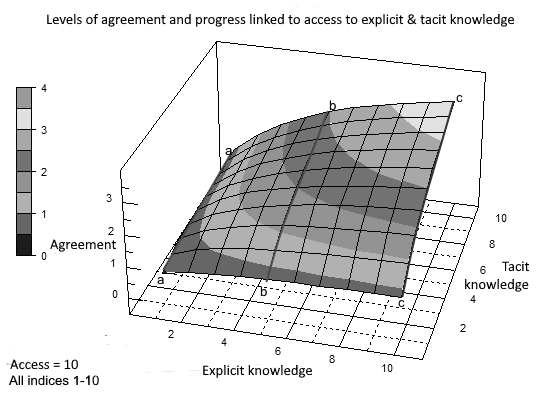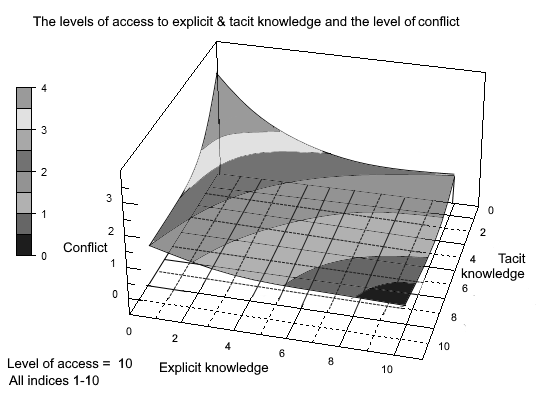Gaps and needs
Protecting the Good Friday agreement
LST logic provides a solution to the need for a "borderless frontier" between Northern Ireland and Eire created by the the UK's withdrawal from membershp of the European Union (BREXIT). There is not need to contravene any international agrements. Any dangers of conflict and transgressions of agrements can be avoided by simply applying this logic. It is just a matter of plotical will to take appropriate decisions to everyone's benefit. |
|
|
Whenever something is missing either in physical goods, provisions and services, or on the social front there is a lack of harmony in relationships as a result of disagreements, these become a matter of concern. It then becomes necessary to address these needs through solutions that close these gaps. In order to identify the most appropriate way to address this situation it is necessary to identify the causes of the gaps in provisions and levels of agreement.
The locational-state model of any analysis helps provide a profile of all of the determinants that need to be included to ensure that all possible contributing factors will be given
due consideration as a contributing factors to gaps. This might appear to be a paradox in the very determinants of the gaps are usually the same determinants that can close the gaps. Therefore a deficiency in the value of a single or several determinants acts as a constraint on the achievement of the desired target property state (LS Law ).
DeterminismDeterminism is an approach that considers all events and states of affairs to have been determined completely by previously existing causes. Therefore determinants have the characteristics of being constraints on the achievement of a target property state as well as being the means of removing these constraints.
The value of information & agreement
The value of information is essentially related to levels of understanding and the significance of the message. Being told that the sun will rise tomorrow is not particularly valuable information because experience has shown most people that this is a given or highly likely event. Being informed that all land areas below an altitude of 200 metres above sea level will be flooded in three days time has two aspects of value:
- If this is an unexpected event then this information augments the level of knowledge
- For all people with houses or farms below an altitude of 200 metres above seas level this information is very valuable
The first essentially adds to the existing fund of knowledge and the second enables people to assign a value to that information measured by the degree to which people can move their families and recover valuable items. In terms of probabilities the value of information is the impact of information on the prior probabilities assigned to different possible events, referred to as priors. Therefore the amount of information received is measured by the size of the actual probability (prior 2), determined by new knowledge or information, divided by the previously assumed probability (prior 1):
| Amount of information received | = | prior2
prior1 |
This is essentially the model applied in Bayesian theory of the advance of knowledge of probabilities. There is a range of different equations used to measure the amount of information in a message but the fundamental operation is the comparison of priors. One of the processes of machine learning is the application of this principle. This is often referred to as Artificial Intelligences (AI) but it is based on George Boole's deductive logic with a cybernetic feeback loop used to udate priors. The value of the information depends upon the relationship of a person's affairs to the event concerned. Knowing the true probability of an event can result in lives, resources and money being saved. The locational-state model provides a detailed model of the determinants that influence events and as a result provides a map of probabilities of outcomes in the form of the target property states. This application of locational-state models enables the calculation of the costs and benefits associated with the allocations of resources to different decision options, before decisions are taken.
|
|
|
Levels of abstraction in constraints analysisThe effect of a determinant on a target property state is the result of a process of transformation of the determinant value to the overall impact of the locational-state model. There is quite often a confusion between these processes and equating these with gaps. Therefore the lack of goods provisions or agreement does not necessarily mean there is a need for investments in product delivery processes or more meetings. The gaps are deficiencies in the states of provisions or agreements. In both cases the first step is to focus on a lower degree of abstraction to identify the data elements that measure the cause of deficiencies. The solutions can be alternative processes or even the abandonment of current processes. For example zones with deficient water for the production of specific crops resolve this constraint through the introduction of irrigation or even moving production to a region with lower water deficits (see agrobiometry). Usually, lack of agreement can be strongly associated with lack of reliable information and which often results in solutions being difficult to identify because lack of information restricts the identification of logical options.
Deterministic theories throughout the history of philosophy have sprung from diverse and sometimes overlapping motives and considerations. In the case of provisions this can relate to inefficient production, low income families being unable to purchase essential needs or disagreements can be linked to a lack of basic information on the relevance and likelihood of desired results being realized if people agree to a course of action.

 Roads to agreement
Roads to agreementIn the context of public choice as the central theme of the constitutional economic process there is a need for reliable factual information (explicit knowledge) that also describes state-of-the-art capabilities and practice which is largely embodied in tacit knowledge. With such as array of facts the range of options for most decisions become structured in a way to facilitate the selection of the best solutions. This is the ideal state of affairs for identifying roads to agreement in the field of political economy and to address the environmental crisis.
The immense potential of this approach is, however, frustrated by the manipulation of the facts in favour of decisions that follow partisan ideologies as opposed to rational, more effective and efficient decision-making procedures that can help reduce disparities and misunderstandings.
